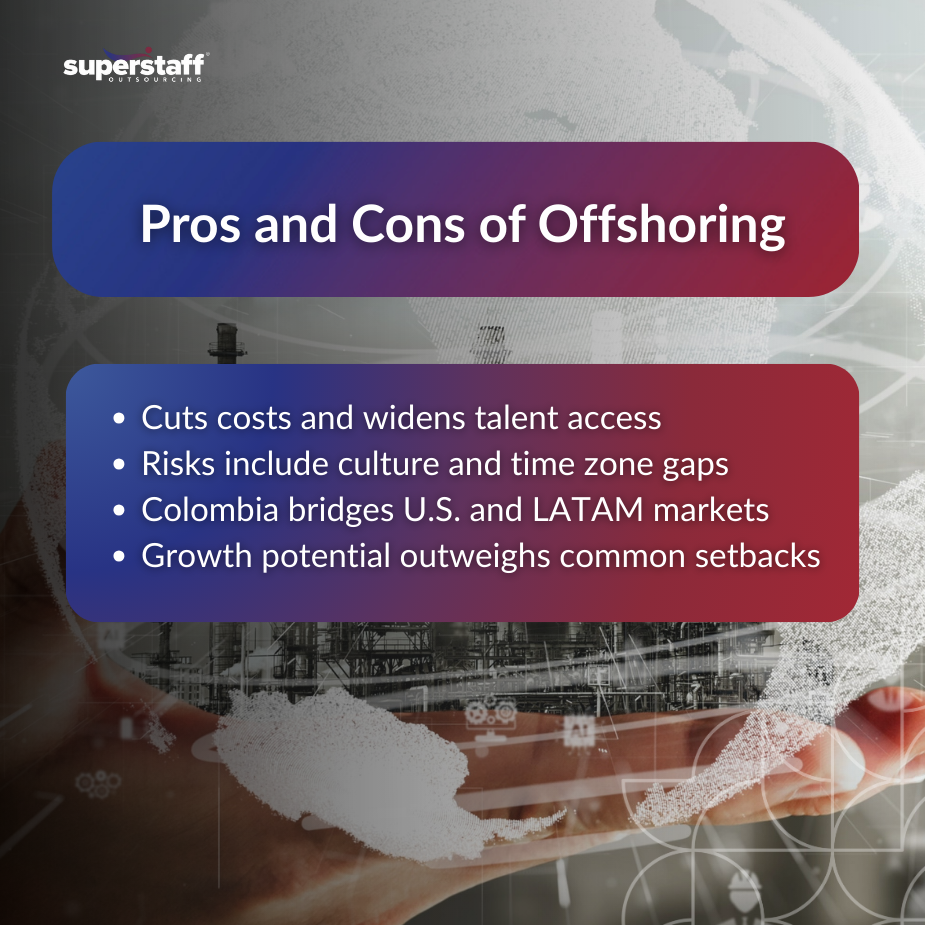
The debate over the pros and cons of offshoring has been alive for decades. On one side, business leaders highlight cost savings, access to global talent, and scalability. On the other, executives worry about time zone misalignment, cultural disconnects, and communication hurdles. These contrasting perspectives make every outsourcing decision a balancing act.
For companies determined to capture efficiency without sacrificing agility or customer satisfaction, Colombia offers a path that tips the scale toward growth. By blending the advantages of global reach with nearshore accessibility, Colombia is emerging as the sweet spot for U.S. businesses ready to take the next step.
Offshoring’s Promise of Global Reach
It’s easy to understand why executives are drawn to the pros and cons of offshoring as a topic of discussion. On paper, offshoring paints an enticing picture. By moving certain business functions overseas, companies can significantly reduce labor and operational costs. Imagine a growing U.S. midmarket retailer facing pressure from rising wages and increased competition. For them, offshoring can unlock cost savings that allow reinvestment into marketing, product development, or customer acquisition.
Beyond lower expenses, offshoring grants access to an enormous pool of global talent. From technical support specialists to finance professionals, companies are no longer limited to their local hiring markets. This is particularly attractive to firms in industries where talent shortages are acute, such as customer service, IT, or back-office functions.
Scalability is another factor. Instead of going through the lengthy hiring process domestically, firms can quickly ramp up their workforce offshore to handle peak seasons or sudden growth.
Still, even as the benefits pile up, executives hesitate. Cost reduction and scalability are appealing, but they do not erase the very real challenges that come with offshore arrangements.
Why Businesses Still Hesitate

Every CEO or COO has heard stories of offshore partnerships that started with high expectations but fizzled because of execution challenges. While the pros and cons of offshoring tend to be evenly matched, the hesitations often outweigh the benefits in boardroom discussions.
One of the most cited drawbacks is time zone gaps. When a U.S. company partners with a provider across the globe, coordinating meetings, solving issues in real time, or maintaining a 24/7 rhythm can feel like a logistical nightmare.
Cultural misalignment is another sticking point. Company culture is often considered an intangible but critical factor in long-term success. If offshore teams fail to integrate seamlessly with the brand’s identity, customers notice.
Communication barriers also play a major role. Even when language proficiency exists, subtle differences in style, tone, or cultural references can lead to misunderstandings and inefficiencies.
These pain points explain why many executives hesitate despite recognizing the potential. The skepticism is valid, but the conversation changes entirely when the focus shifts to nearshore destinations.
Colombia Redefines the Offshore Experience
This is where Colombia steps in and begins to rewrite the narrative surrounding the pros and cons of offshoring. Unlike traditional offshore hubs located half a world away, Colombia offers proximity and compatibility that reduce many of the usual barriers. For U.S. businesses, this makes an immediate difference.
Time zones, often a source of frustration in global operations, become a non-issue. Colombian teams operate within overlapping business hours, which allows real-time collaboration. Cultural ties between Colombia and the United States also help bridge gaps. Shared media consumption, growing bilateral trade, and similarities in work styles make interactions smoother.
On top of that, Colombia has developed a bilingual workforce that’s highly proficient in both English and Spanish, which is invaluable for customer-facing roles.
What sets Colombia apart is not simply that it avoids the typical downsides, but that it transforms offshoring into a nearshore partnership that feels more like an extension of the business than a distant transaction.
Building on Innovation and Skilled Talent
Beyond addressing the drawbacks, Colombia is positioning itself as a growth engine in the outsourcing world. The conversation about the pros and cons of offshoring usually revolves around compromise, but Colombia’s unique strengths turn it into a discussion about opportunity.
The country has invested heavily in its education system and digital infrastructure, creating a workforce well-versed in technology, customer service, and back-office functions. Major cities like Medellín have reinvented themselves from manufacturing hubs into thriving centers of innovation. This focus on education and upskilling has resulted in a talent pool ready to take on complex roles, from IT development to AI support and data analytics.
Government support has also fueled industry growth, particularly in the IT and CX sectors. These efforts are not abstract. Businesses that offshore to Colombia encounter employees who are not just qualified but highly adaptable, digitally savvy, and motivated to deliver results.
The nation’s growing ecosystem of startups, tech initiatives, and service providers signals that Colombia isn’t content with being a follower. It is actively building the capacity to lead.
Why U.S. Companies Offshore to Colombia
For U.S. business leaders, the decision to expand internationally comes down to more than cost savings. Understanding why U.S. companies offshore to Colombia sheds light on the country’s unique advantages.
Companies are discovering that Colombia provides a blend of growth, responsiveness, and long-term partnership potential that other destinations struggle to match.
Nearshore operations make collaboration faster and smoother, which is critical for industries that thrive on agility, such as retail, finance, and tech.
Customer experience improves as well, since Colombian agents share not only language proficiency but also cultural alignment with North American consumers. This results in more natural conversations and a stronger brand experience.
Strategically, Colombia serves as a gateway to the broader Latin American market. Businesses that establish operations here can scale regionally while maintaining strong ties to the United States.
The net effect is that Colombia shifts the conversation from risk management to growth acceleration. For decision-makers, this is a compelling reason to reconsider traditional offshoring destinations and embrace a nearshore strategy instead.
The Role of Offshore Latin America in Growth
When evaluating the pros and cons of offshoring, many leaders overlook the rising importance of offshore Latin America as a whole. Colombia, in particular, embodies the strengths of the region while setting itself apart through stability, innovation, and skilled talent. Unlike far-flung offshore destinations, Latin America offers geographic and cultural proximity that naturally aligns with U.S. business needs.
What’s noteworthy is how Latin America’s workforce increasingly combines technical proficiency with a service-oriented mindset. In Colombia, this balance shines in areas like customer support, IT, and back-office services.
U.S. firms can tap into teams that are not only technically capable but also culturally equipped to handle nuanced customer interactions. This is a rare combination that strengthens client relationships and brand loyalty.
As companies look to balance cost efficiency with quality, the rise of nearshore options in Latin America reframes the traditional outsourcing equation. The region, with Colombia at its center, is demonstrating that cost savings and quality service no longer need to be mutually exclusive.
Business Process Outsourcing in Colombia
Another angle that highlights the pros and cons of offshoring in a new light is the surge of business process outsourcing Colombia has to offer. Over the last decade, the country has developed into a competitive BPO hub. Major cities like Bogotá and Medellín now host a wide range of outsourcing providers specializing in customer experience, finance, HR, and IT services.
This growth is not accidental. Colombia’s strong telecommunications infrastructure, combined with government incentives, has created an environment where outsourcing firms can thrive.
For U.S. companies, this translates into reliable service delivery supported by modern infrastructure. Additionally, Colombia’s BPO sector emphasizes workforce development. Training programs focus not just on technical skills but also on cultural awareness and customer service excellence.
These developments help explain why companies that once dismissed offshoring because of quality concerns are revisiting the conversation. Colombia’s BPO industry is proving that cost efficiency can coexist with a high standard of service.
SuperStaff’s Presence in Colombia
At SuperStaff, we understand the nuances of the pros and cons of offshoring, which is why we’ve expanded into Colombia to support our clients more effectively.
With operations in both Medellín and Bogotá, we are strategically positioned to help businesses harness the advantages of nearshoring while maintaining flexibility across global markets. Our expertise spans customer experience, back-office support, and specialized roles, ensuring we can build teams tailored to your specific needs.
More importantly, we integrate offshore and nearshore models seamlessly. This means you don’t have to choose between the Philippines or Colombia; you can design a blended model that draws on the strengths of each.
What sets SuperStaff apart is our people-centered approach. We believe outsourcing is not just about filling roles but about building teams that feel like a natural extension of your business. Our focus on culture, communication, and collaboration ensures your customers experience the same level of service they expect from your in-house teams.
The Pros and Cons of Offshoring Revisited
The ongoing conversation about the pros and cons of offshoring will likely continue as businesses weigh risks against opportunities. Yet Colombia demonstrates that the scale doesn’t have to be evenly balanced.
With its nearshore proximity, bilingual talent, cultural alignment, and innovation-driven workforce, Colombia tilts the conversation decisively toward growth. For U.S. companies navigating rising costs, talent shortages, and customer expectations, Colombia offers more than an alternative. It provides a growth strategy that aligns efficiency with quality.
By partnering with SuperStaff, you can leverage our expertise and presence in Colombia to unlock these advantages. Explore how our tailored outsourcing solutions can help your business not only adapt but thrive in today’s competitive landscape.






